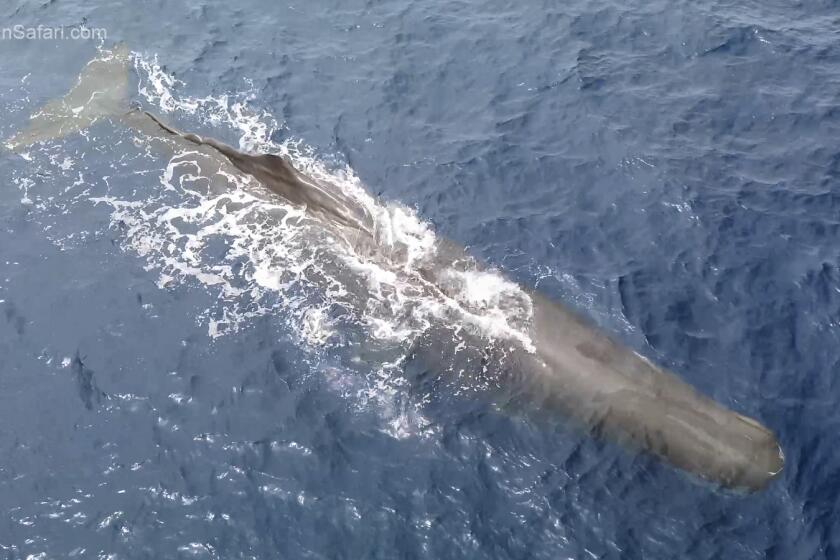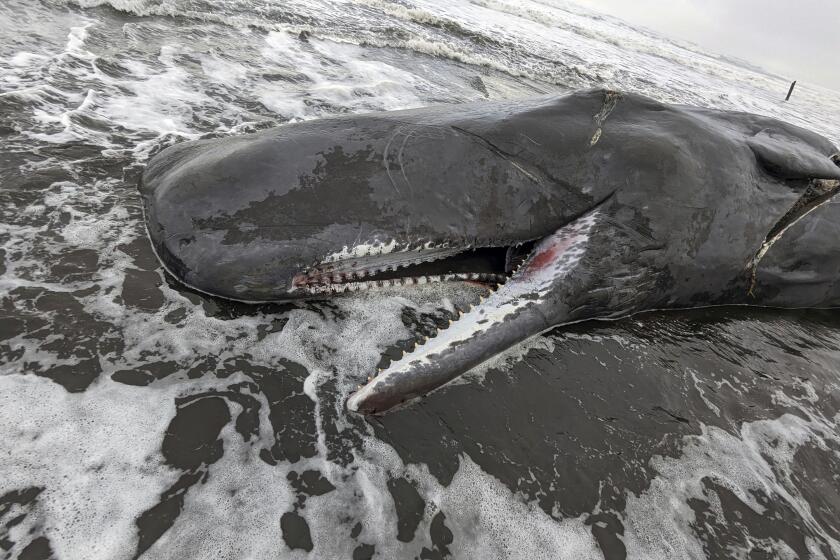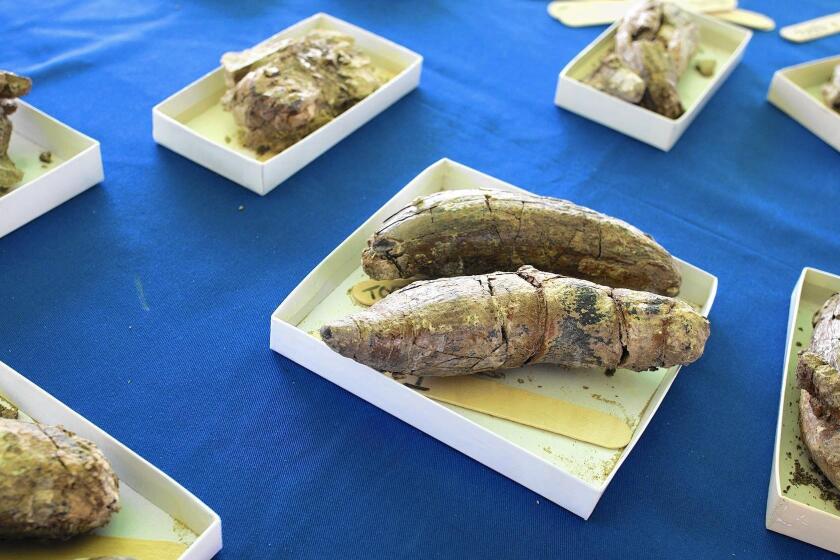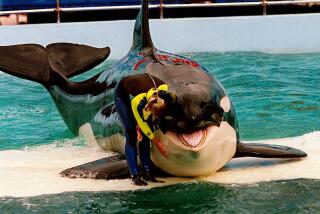Caribbean island Dominica creates world’s first marine protected area for endangered sperm whale
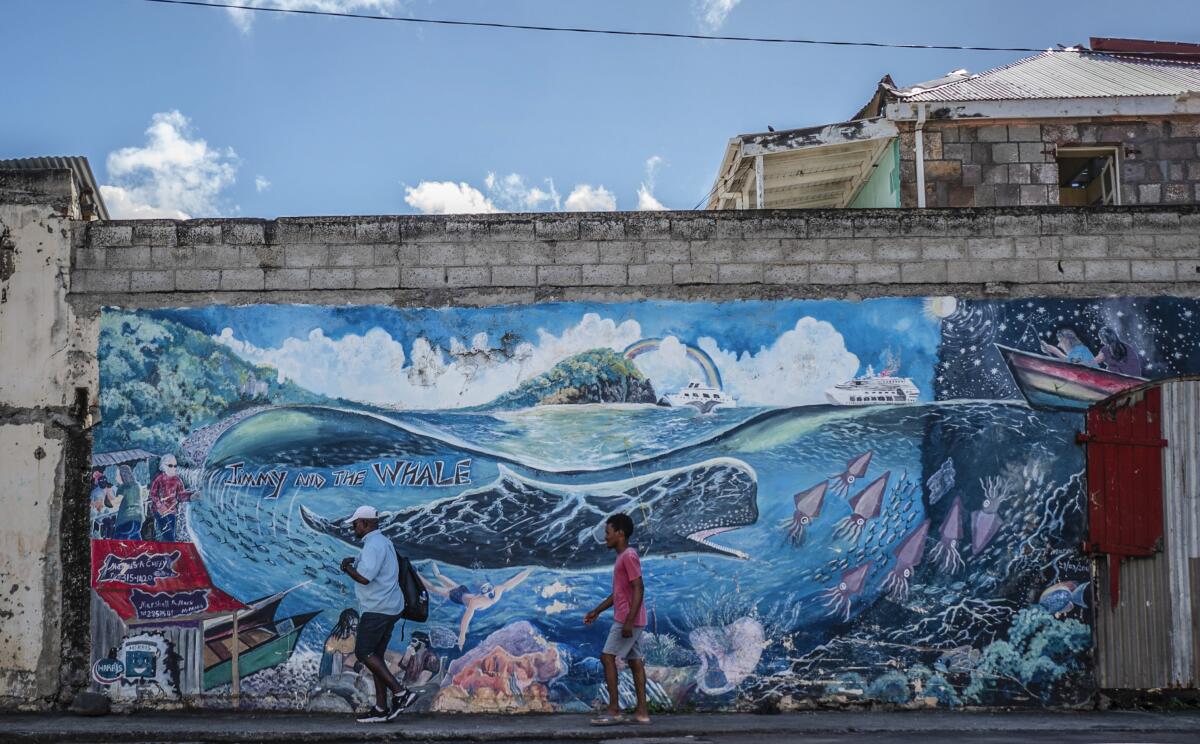
- Share via
SAN JUAN, Puerto Rico — The tiny Caribbean island of Dominica is creating the world’s first marine protected area for one of earth’s largest animals: the endangered sperm whale.
Nearly 300 square miles of royal blue waters on the western side of the island nation that serve as key nursing and feeding grounds will be designated as a reserve, the government announced Monday.
“We want to ensure these majestic and highly intelligent animals are safe from harm and continue keeping our waters and our climate healthy,” Dominica Prime Minister Roosevelt Skerrit said in a statement.
Scientists say the reserve not only will protect the animals, but will also help fight climate change.
A trio of sperm whales — believed to be adult males, each about 50 to 60 feet long — has been spotted several times this past week off Orange County.
Sperm whales defecate near the surface because they shut down non-vital functions when they dive to depths of up to 10,000 feet. As a result, nutrient-rich poop remains along the ocean surface and creates plankton blooms, which capture carbon dioxide in the atmosphere and drag it to the ocean floor when they die. And sperm whales in Dominica are believed to defecate more than whales elsewhere, said Shane Gero, a whale biologist and founder of the Dominica Sperm Whale Project, a research program focused on sperm whales in the eastern Caribbean.
It’s unclear why sperm whales seem to defecate more in Dominica. Gero said it could be they’re eating twice as much, or maybe there’s something particular about the type of squid they’re eating.
“In some respects, sperm whales are fighting climate change on our behalf,” Gero said in an interview.
Less than 500 sperm whales are estimated to live in the waters surrounding Dominica, part of a population that moves along the Lesser Antilles chain, swimming as far south as St. Vincent and north into Guadeloupe. Unlike sperm whales elsewhere in the world, the ones around the eastern Caribbean don’t travel very far, Gero said.
He noted that sperm whales are a matrilineal society, with young males leaving and switching oceans at some point in their lives. As a result, protecting the species is key, especially if few female calves are born, he said.
A 40-foot sperm whale that washed up dead on Oregon’s northwestern coast was killed after being struck by a ship, federal biologists have determined.
“One calf being entangled [in fishing gear] can mean the end of a family,” he said.
Sperm whales can produce a single calf every five to seven years.
In waters around Dominica and elsewhere, sperm whales have been hit by ships, entangled in fishing gear and affected by agricultural runoff, limiting their survival. In the pre-whaling days, an estimated 2 million sperm whales roamed the Earth’s deep waters before they were hunted for oil used to burn lamps and lubricate machinery. Now, some 800,000 are left, Gero said.
The government of Dominica said the reserve will allow sustainable artisanal fishing and delineate an international shipping lane to avoid more deaths of sperm whales, which have the largest brain in the world and can grow up to 50 feet long.
Once the reserve is created, the prime minister said his administration will appoint an officer and observers to ensure the area is respected and that whale tourism regulations are enforced. Visitors can still swim with sperm whales and see them from a boat, but in limited numbers.
More than 1,200 feet up on a hillside in Irvine probably isn’t the first place you’d expect to find the final resting place of a 40-foot sperm whale, but that’s what Melissa Macias stumbled upon last month.
The move was praised by scientists and conservationists such as Enric Sala, an explorer-in-residence at National Geographic.
“The government of Dominica has realized that the sperm whales, which were probably here before humans, are also citizens of Dominica,” he said. “These whales will spend most of the year offshore the island. So, they are taking care of some of their citizens in a way that few nations have ever done before.”
An estimated 35 families of sperm whales spend most of their time in waters surrounding Dominica. Gero said some are likely more than 60 years old, and they communicate via clicking sounds in a vocalization known as codas.
“That’s kind of like asking, ‘I’m from Dominica, are you?’” Gero said. “It’s a symbolic marker.”
Gero and his team of researchers also have named individual whales. One is dubbed Snow because one scientist was reading a Margaret Atwood book with a character named Snowman. Another sperm whale was nicknamed Fruit Salad because a researcher happened to be snacking on that at the time. That whale’s calf was named Soursop, in keeping with the theme.
More to Read
Sign up for Essential California
The most important California stories and recommendations in your inbox every morning.
You may occasionally receive promotional content from the Los Angeles Times.
